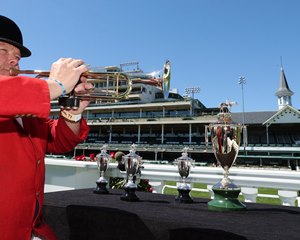Churchill to Move 2021 Derby Back to Traditional Date


Racing's biggest day will return to its traditional date of the first Saturday in May in 2021 based on plans by track owner Churchill Downs Inc.
While the Kentucky Derby Presented by Woodford Reserve (G1) will not completely return to normal—CDI envisions a crowd of 40-50% capacity of its usual reserved seating—it will return to its traditional date, which in 2021 will be as early as it can be, May 1.
CDI doesn't anticipate selling any general admission tickets, but the company will revisit that possibility as the date of the event gets closer.
It will mark the quickest turnaround in Derby history as this year's classic was moved to Labor Day weekend, Sept. 5, because of the COVID-19 pandemic. CDI had hoped to conduct the 2020 race before fans, with reduced capacity, but that plan ultimately fell through.
In a conference call with analysts and investors Oct. 29, CDI CEO Bill Carstanjen outlined the 2021 plans for Churchill Downs to stage the race.
"We've already begun preparations for the 147th Kentucky Derby, which will be run on May 1, 2021," Carstanjen said. "We do not anticipate moving off our traditional date of the first Saturday in May.
"We are starting with the assumption that we will limit the number of reserved seats to 40% to 50% of capacity, and we will delay selling any general admission tickets—which do not come with seats—until we are closer to the date of the Derby.
"We do not sell many general admission tickets this far out from the event in any case. If the circumstances surrounding the pandemic improve, then we will sell more reserved seats and consider selling general admission tickets."
During the call, Carstanjen noted the financial hit the company suffered in terms of the 2020 Derby. It affected a number of revenue streams.
"We were significantly impacted by the loss of ticket revenue, fewer sponsorships, and lower wagering on the Derby itself and the races in general during Derby week," Carstanjen said.
All-sources wagering on Derby Day totaled $126 million, down 49.8% from last year's $250.9 million. Carstanjen said those declines resulted from a number of factors, including the loss of many casual fans confused because of the non-traditional date, loss of on-track wagering options at other tracks throughout North America that were closed because of COVID-19, and declines in field size because of a variety of factors—including travel restrictions and a number of heavy favorites in the races.
Despite those losses, Carstanjen said running the Derby when CDI did and not allowing fans were the right decisions to protect the public health.
"While running the Kentucky Derby on Labor Day weekend and spectator free had a significant impact on our financial results this year compared to prior years, it was our best option and allowed us to run the event in a manner our customers could see was responsible and appropriate to protect the safety of fans and team members as well as protect the asset," Carstanjen said. "While this was a difficult decision, it was the right one."
